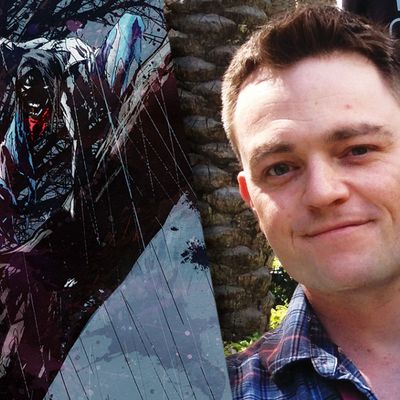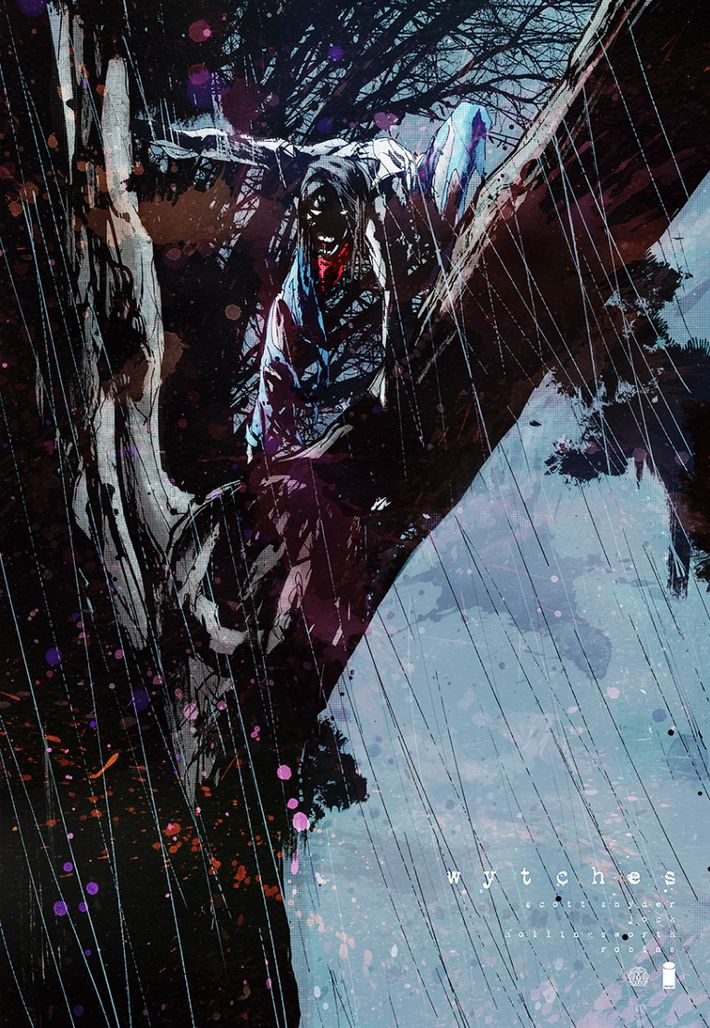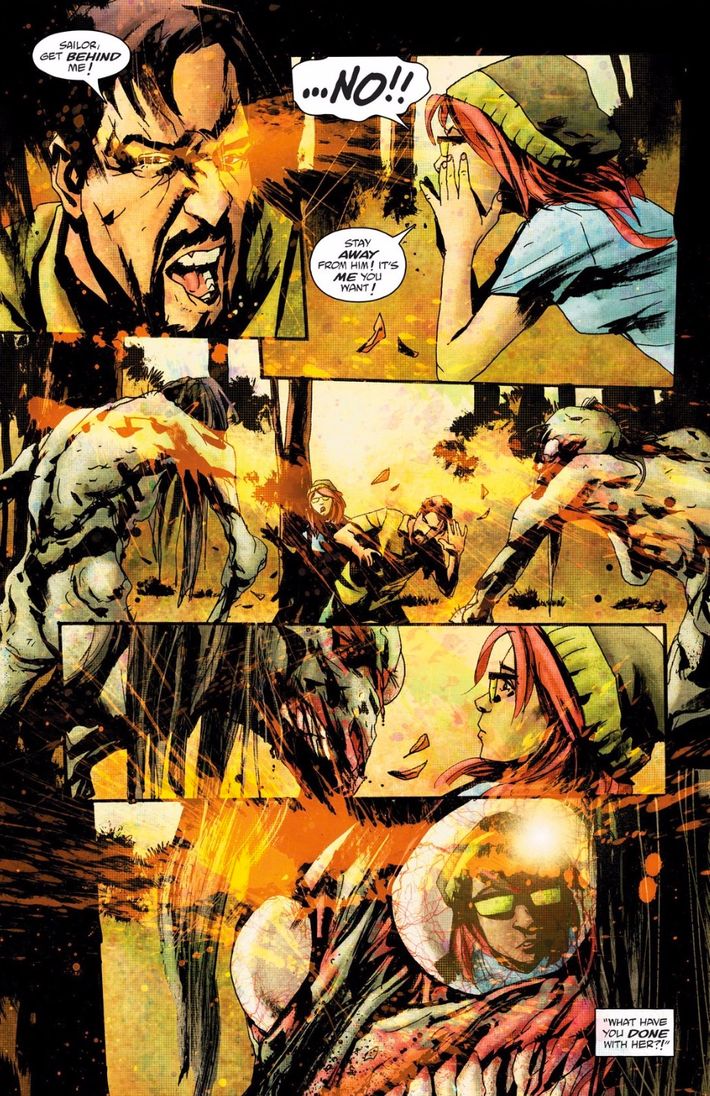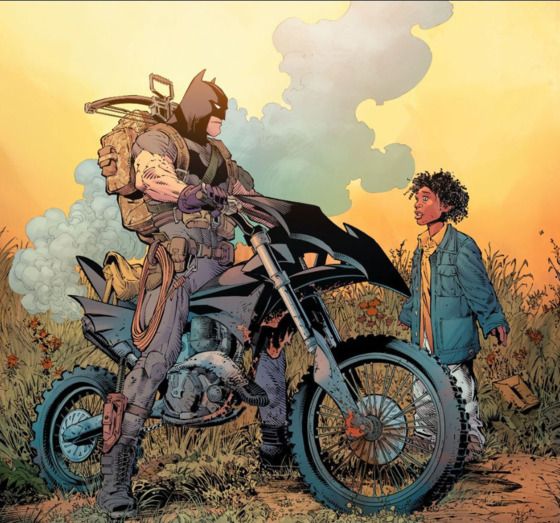
Scott Snyder has had one of the faster rises to fame in recent comics history, and he shows no sign of slowing down. He only started writing in the medium in 2009, after a few years of publishing prose fiction, and is now one of its biggest stars: He’s been writing Batman since 2011 and regularly topping sales charts with it; he’s won the industry’s top awards for his series American Vampire; and he’s garnered massive acclaim for everything from superhero titles like Superman Unchained to sci-fi thrillers like The Wake. But he’s never done anything quite like Wytches.
Wytches is a creator-owned horror series Snyder began alongside the mononymous artist Jock last year for indie publisher Image Comics, and its first volume comes out in a collected edition this week. It follows the travails of the Rooks, a family struggling with alcohol abuse, disability, and — in the case of their daughter, Sailor — crippling anxiety issues. They move to a small town and stumble upon the town’s history with tall, grotesque, forest-dwelling creatures called wytches (the y being crucial — it turns out that witches are merely humans who have involved themselves with wytches, though I won’t spoil the details).
What follows is a tale of remarkably visceral terror, helped along by Jock’s talent for drawing unsettlingly amorphous figures and by Snyder’s deeply personal connection to the story. Although none of it is autobiographical, Snyder includes personal essays at the end of each chapter, detailing how his lifelong love of horror stories dovetails with his long-standing struggles with anxiety and depression. It’s resonated with readers, and with Hollywood: Wytches is being adapted for film by Brad Pitt’s Plan B Entertainment. I caught up with Snyder to talk about mental health, how to write a good Batman story, and comics’ ongoing takeover of American entertainment.
Because we’re both comics geeks, let’s start with a trivial nitpick. An important aspect of Wytches is that in the story, people talk about creatures called wytches, with the y in there, as being different from witches, with an i. So: How are the characters pronouncing the terms differently?
Y’know, I feel bad, because I’ll be at a convention and people will come up to me and be like, “I love Waaai-tches!” and I don’t want to correct it. And I have friends who I feel are always taking the piss out of me by always pronouncing it wrong. But we just pronounce both of them as witches and just try to keep it simple.
But in the dialogue you’ll have people saying, “They’re not witches, they’re wytches!” How can anyone understand what’s being discussed?
I figure they just kind of say it in a scarier, breathier, raspier voice. They just put on the Batman voice.
You’ve written in essays at the end of the issues that the wytches are reflections of some pretty specific visual fears you had as a child. How directly did Jock translate your nightmare into reality?
He just enhanced it. I’ll give him something like, “I’d love it if their faces could be sort of on the side, so that they can peek around trees, they’ve sort of evolved this way to look from behind the trunk.” Then he’ll draw them in such a way that not only are they like that, but their eyes are this strange, glassy reflective hue that then allows them to not only look at us, but look at us at all angles, like a spider. You should see the initial sketches, too.

Oh? Were there prior visual iterations that didn’t work?
The thing that makes this iteration scary is — and there were prior iterations that were grosser, or bigger, or more predatory-looking, with sharper teeth — but the thing that makes them scary to me, and the thing we kept coming back to, is this idea that they are meant to be this twisted reflection of us, and this mirror held up to us. When he landed on the final design, I felt like it was just humanoid enough that it seemed like they could be evolutionary offshoots from us, and yet they’re completely alien at the same time. That kind of sweet spot.
The big running theme in the end-of-issue essays is that horror stories have often helped you combat bouts of depression and crippling anxiety. Did you have that theory about yourself before you started Wytches? Did writing the comics make it occur to you?
Well, it definitely existed for me before, because I was always wondering why I’ve gravitated toward horror so much. When I’ve gone through those periods of depression or anxiety, it’s almost like your body is telling you constantly with these panics that the world really is the terrible place that you think it is, and all the things you fear are true about yourself have to be true. This sea of evidence is everywhere in this twisted, fun-house-mirror maze. So, for me, I’ve been always curious: How do I keep coming back to horror, then? I think that the reason I love it so much is that because good horror isn’t just about scary monsters or faces on the side of their heads and so on. Usually those monsters are just extensions of the characters’ deepest fears about themselves. You have a book like The Shining, where the hotel is scary — but scarier because it’s the haunted house of Jack Torrance’s heart.
Here, horror can be very healing and therapeutic while you deal with things like depression, when everything just feels like there’s absolutely no way out. Not just because the hero usually makes it out! Because even when they don’t make it out, you’re seeing people work through tremendous, tremendous doubt. And when you see other people, you don’t feel alone. In that way, even in the grimmest horror, you can find a connection and see other people thinking about some of the things that you worry [about], too. I don’t know if I would recommend that as a remedy, like, Hey, kids, you feeling down? Go out and watch Necromancer! I’m saying that in good horror I think there’s a sense of reaching out and saying, “These fears? We can overcome them. Or even if we can’t, we acknowledge them together.”
My one complaint about Wytches was it felt like it could’ve been longer.
This is just the first arc. We’re already working on the second arc right now. It comes back in winter. Sailor is now part of a group that hunts the wytches in their burrows, and you see the differences between them all over the country, throughout history, what the history is of this group of hunters. It’s a much broader and deeper arc than the first one, which is about, personally, for me, both the challenges of being a kid with anxiety and also all the challenges of being a parent. The second one is largely about the challenges of growing up, both when you reach an age and have to let go of your parents. And the wytches always offer ways around the natural, so, well, what if you didn’t have to do that? So a lot of what the second arc is powered by [is] that set of emotions, that deep desire not to let go of childhood, and the witches sort of preying on that.

And it’s a different species of wytches. It takes place in the Southwest, which has been a lot of fun because I think you expect there to be no wytches because there are no trees. But they just dig deeper into the sand, and they’re this whole different species. The only problem is initially I didn’t put it together when I was talking about them to people; I was like, “They’re sand wytches,” and I didn’t catch how stupid that sounded, that it sounded like an actual fucking sandwich that you eat. And everyone would always giggle and I was like, What? They’re scary! I don’t get it. Finally, someone told me what was happening, and now they’re “desert wytches.”
So, I know there’s only so much you can say about this, but Wytches got picked up by Brad Pitt’s production company, Plan B, for a movie adaptation. What’s the status there?
The film version seems to be going along great. Plan B has been really wonderful to us, sort of giving us a window into that process and putting us in touch with the screenwriter, who’s just finished his first draft. He was actually just in South America and he was going hiking, and he found this series of underground caverns and sent us pictures, me and Jock. And he was like, “I found a [wytch] burrow!” I love the version that they’re making, which cuts pretty close to ours with a few small differences.
And have you had any interactions with Brad Pitt yet?
No, but I swear to you that is my wife’s absolute No. 1 request, all the time. And there’s no jealousy whatsoever, because who doesn’t have a crush on Brad Pitt? I have a crush on Brad Pitt! Any of us would be happy to meet him. But Jock and I, our biggest stipulation was, when we were in a meeting and they were asking us if there was anything we wanted to be involved in with the production of the film, I said, “We both really want to be bumbling cops.”
How do you make the mental or emotional switch between writing an issue of Wytches versus writing an issue of Batman?
I just put on a cowl. I put it on, get my voice ready, just do it. [Laughs.] Ultimately, the weird thing is, I really try to write them the same. These two things balance each other out really well, for me personally. The key for Batman is to write it like it’s creator-owned. That’s the trick, and Grant Morrison will tell you that, and Denny O’Neil told me something similar, too. You have to go into it thinking, This is my version. I’m making him up. I know him better than anybody else. Because then he’s a reflection of my love of the character with some peculiar details, and my fears, all of these things. The city is a reflection of me. This thing is mine, and it might not be anywhere near as good as anyone else’s, it might be flawed, but it’s mine.
[The] “Zero Year” [story line] was about what I hope Batman means to my kids, where he’s up against these comic-book veiled versions of the things I worry about for my children: random gun violence, terrorism, resource depletion. “Endgame” to me was largely about — well, Joker represents meaninglessness, he’s always saying, “Look at you trying to make something of your life, thinking anything that you do matters. And I laugh, because none of it means anything, it’s just a void.” And Batman is a character who’s created out of meaninglessness. His parents are killed in a random act of violence. And yet he turns into this engine of meaning, where he says, “Make your life matter. Change your city, change the lives of the people around you, make a legacy.”

So when it comes to something like Wytches, it’s actually not that big of a switch. The fun of superhero comics is finding ways to turn the pieces that you know so that they’re suddenly about things that you want them to be about, as long as they’re true to the core and true to the DNA of the mythology. That’s the way my favorite Batman stories have always worked: They’re transgressive, they’re personal, you can see the interest of that writer’s work, it’s clear in everything they do in those stories.
Right, and you can always sniff out a writer who thinks superhero stuff is just a way to pay the bills. It’s always, there’s an emptiness to it. That said, creators can now pay the bills with creator-owned stuff, what with production companies snapping up the film and TV rights to smaller titles like Wytches or The Wicked + The Divine or Bitch Planet and so on. It’s a pretty good time to be writing indie comics.
It’s happening so fast that all of us, our heads are all spinning. I mean, all of us are just totally stunned by it. We would still be doing these series anyway, even if they made nothing or we were in the red or whatever. Of course there’s a big superhero boom, that will always be there whether there are comics or not. But the fact that the creator-owned world is getting such attention, it really is phenomenal. I would also say it’s an inclusive community: We’re all rooting for each other. We celebrate the fact that people just seem to see right now how great comics are, whether it’s creator-owned, superheroes, any of it. It’s a medium where you can get anything you want, as a reader, from Fun Home to Justice League. Everything exists in comics.
Right, I mean, how goddamn crazy is it that Fun Home won best musical at the Tonys?
We’re everywhere. We’re everywhere and we’re not going away.




